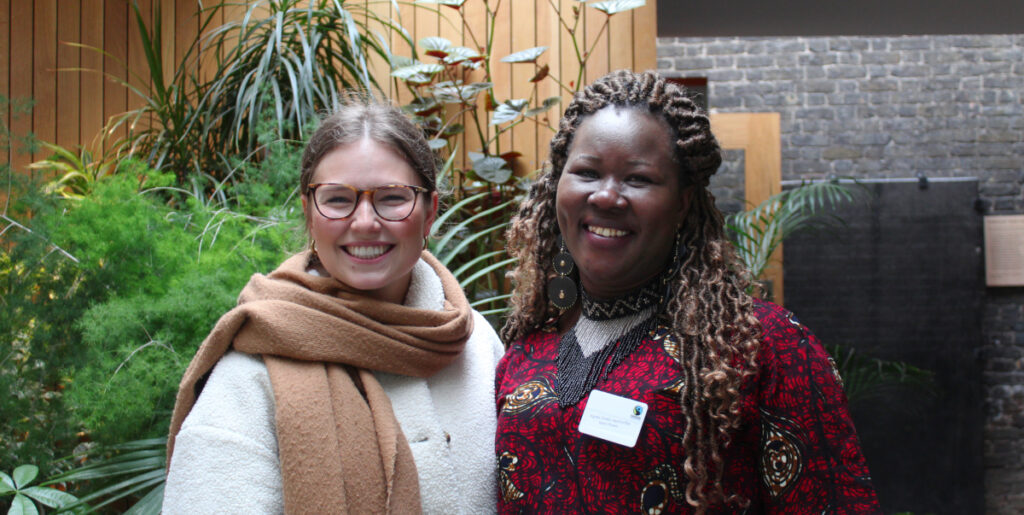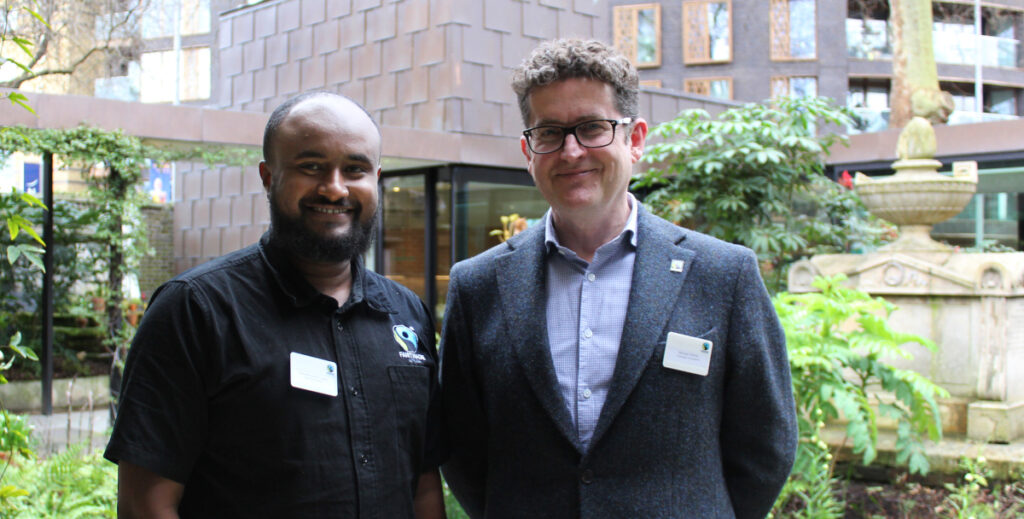The flower industry must embrace partnerships if it is to find sustainable solutions to the challenges facing the sector, the Fairtrade Foundation has said.
This call came from Kerrina Thorogood, Partnerships Director at the Fairtrade Foundation. She was speaking at an exclusive event on sustainability in the flower industry hosted by Fairtrade at the Garden Museum in London on 29 March.
The event included a variety of panel discussions and interactive sessions, with speeches from a Fairtrade flower worker, industry experts, thought leaders, academics, and UK retailers, all designed to inspire joint action on sustainability in the flower industry.
Looking to the future
Discussing the achievement and growth in Fairtrade flowers – 17 percent growth in the past year alone – Thorogood looked to the future: ‘It’s critical that we work both in flower-powered bilateral partnerships as well as flower-powered multi-stakeholder dialogues like we are having today. Both are needed if we are going to solve [issues in the industry] at the pace and scale needed. I really encourage us to do this.
‘The more conversations the better – we owe it to producers and consumers to work together to ensure a blooming, sustainable flower industry continues far into the future.’
Agnes’ story
Agnes Chebii, Greenhouse Supervisor at the Kenyan Fairtrade-certified flower farm Karen Roses, highlighted the current challenges in the flower-growing sector, including gender equality, women’s rights, low wages and climate change.
I’ve worked in the industry for 23 years and I can tell you things were really tough before Fairtrade.
Agnes Chebii, Karen Roses Greenhouse Supervisor
She said: ‘I’ve worked in the industry for 23 years and I can tell you things were really tough before Fairtrade. My mother died while I was at school and people took advantage of me. So, I dropped out of school and went to look for a job.
‘I was employed as a child labourer at a flower farm. There were no rules. We used to work without PPE, we used to do very hard work, there was no overtime. Sexual harassment happened there.
‘After a few years I heard that the farm was going to be certified by Fairtrade. They introduced their Standards, then the gender programme came along. So many women were employed. From that time, we are working in a very conducive environment – our rights were protected. It is the right direction to go.

‘That is why I’m still working there. Because of the [Fairtrade] Standards, we women are able to access leadership positions. For someone like me, who dropped out of school, I have the chance now through the [Fairtrade] Premium to do some training and now I’m a senior supervisor leading the workers. I’m on the gender committee of the workers, which makes sure there is no discrimination, no gender-based violence, and no sexual harassment.’
Agnes continued: ‘The climate crisis in Kenya affects the lifecycle of flowers. But the Fairtrade Standards give us solutions. For instance, we use rainwater collected in the greenhouses when it is too sunny, so we can irrigate our plants. So, it is really challenging but when you buy Fairtrade, you’ll have done something very nice for the farmer.’
Starting with the grower
Mike Gidney, CEO of the Fairtrade Foundation, said in his closing statement: ‘We all know about the increasing requirements for companies to respond to the ESG risks of their operations. Even while we recognise the progress being made on the ‘E’ of ESG – the crucial response to the climate crisis – we must also see faster progress on the ‘S’, the human and social impact of global supply chains.
We must re-double efforts to bring together respect for human rights with efforts to tackle the climate crisis that we all face. And it starts with the farmer.
Mike Gidney, CEO of the Fairtrade Foundation
‘It isn’t enough to decarbonise your supply chain, it isn’t enough to examine your packaging, your logistics and the costs: sustainable businesses need to look at where this all starts, and it starts with the grower.
‘Bringing together the ‘E’ and the ‘S’ of ESG into a holistic framework is a really complicated challenge. But that is why we all need to work together. Poverty in East African flower farms is a systemic problem. Women and girls are still – even today – vulnerable to exploitation and gender-based violence. The human rights risks are immense in flowers.
‘So, we must re-double efforts to bring together respect for human rights with efforts to tackle the climate crisis that we all face. And it starts with the farmer. With the grower. With the worker. The more we can listen to the experts – the farmers – the more success we will have.’
The Fairtrade-run event ended with an interactive, sustainable floristry workshop with broadcaster and designer Hazel Gardiner, who led the participants in a session using Fairtrade flowers, fillers, and plants
– ENDS –
For more information, images and interviews, contact Mollie Letheren Smith via:
- Email: media@fairtrade.org.uk
Notes to editors:
About Fairtrade
Fairtrade changes the way trade works through better prices, decent working conditions, and a fairer deal for farmers and workers in low-income countries. Fairtrade Foundation is part of the global Fairtrade movement overseen by Fairtrade International, which represents 1.9 million small-scale farmers and workers worldwide. The FAIRTRADE Mark appears on more than 37,000 products. Beyond certification, Fairtrade empower producers, partner with businesses, engage consumers, and advocate for a fair and sustainable future. Find out more at www.fairtrade.org.uk
Fairtrade flowers
• There are 74 Fairtrade-certified flower farms across the world.
• When it comes to building a greener, fairer, and more sustainable future, women are the key drivers of change. And in the Fairtrade community, where more than half of the 73,000 workers on Fairtrade-certified flower farms are women, ensuring their empowerment and gender equality is not just the ethical thing to do – it’s smart business.
• Five of the major supermarkets stock Fairtrade flowers: Asda, Aldi, Lidl, Co-op, and M&S.
• In 2022, £6.5m in Fairtrade Premium went to Fairtrade flower workers to invest in healthcare, education and to support additional income generation.
• Fairtrade launched its new Fairtrade Florist Scheme in 2021: Lavender Green Flowers was the first florist to offer Fairtrade flowers at their store.
• Fairtrade exhibited at the Chelsea Flower Show for the first time in 2021 to tell the story of Fairtrade flowers with the help of Lavender Green Flowers, JZ Flowers, and FleuraMetz.
• Recommendations from Fairtrade’s UK Government-funded project, Building Resilience in Flower Supply Chains, have evolved into the beginning of a multi-stakeholder initiative that will tackle sustainability challenges facing the flower sector.
• Fairtrade Foundation and Aldi UK recently announced that they are partnering on the next stage of a £400,000 programme to support women in the Ethiopian flower sector and tackle some of the systemic issues they face. The new initiative builds on previous efforts to improve working conditions and raise awareness of workers’ rights, gender and disability inclusion of workers on flower farms.
Photo: (l-r) Fairtrade Africa Senior Project Officer Wenedemeneh Engida and Fairtrade Foundation CEO Michael Gidney. Photo credit: Hazel Thacker.
